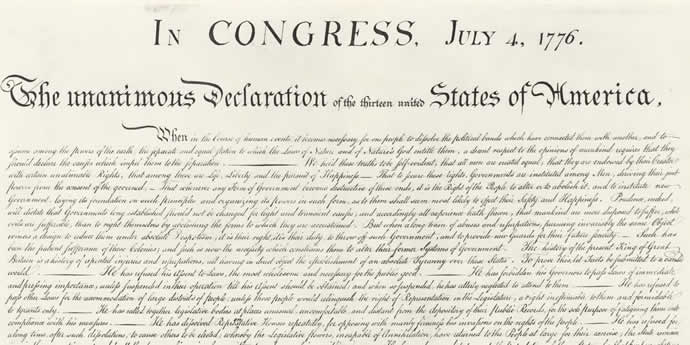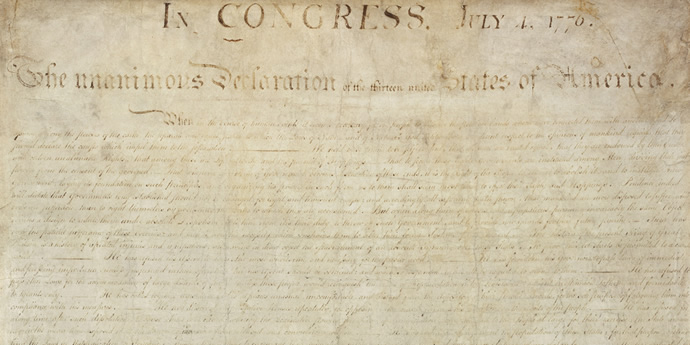The Declaration of Independence
See the signatures that started a nation
On July 4, 1776, representatives from the original 13 American Colonies came together to formally adopt a document that listed all their grievances against the British government and announce their independence from the crown. This document became known as the Declaration of Independence. Print of the Declaration of Independence, 1976, from the National Archives, Records of the Department of State
Print of the Declaration of Independence, 1976, from the National Archives, Records of the Department of StateIn the years leading up to this landmark document, the British Parliament passed a number of Acts that unfairly taxed the American Colonies, without any representation. In 1773, as an act of revolt against the British and their tax on tea in America, colonists threw crates of tea imported from Britain into the Boston harbor. Over the next two years, the Colonies grew more and more angry at the British, until they decided they had had enough.
In June 1776, a committee that included Thomas Jefferson, Benjamin Franklin, John Adams, Roger Sherman and Robert R. Livingston came together to draft a document that would not only sever the colonies’ ties with King George III, but also express the values of the new country. As the main draftsman of the Declaration, Jefferson wanted the document to feature three main truths: that all men are created equal, that all men have some rights given to them by God and that among these rights are life, liberty, and the pursuit of happiness.
However, King George III did not want to lose this valuable land, and so the colonies took to arms to defend their new country and rights in what is now known as the Revolutionary War. Unfortunately, it took five long years of war before the British surrendered in October 19, 1781, and the United States of America could begin the business of becoming a nation.
 Engrossed Declaration of Independence, 1776, from the National Archives, Records of the Continental and Confederation Congresses and the Constitutional Convention.
Engrossed Declaration of Independence, 1776, from the National Archives, Records of the Continental and Confederation Congresses and the Constitutional Convention.Sign the Declaration
Did you know?
There is something written on the back of the Declaration of Independence, but it isn't a secret map or code. Instead, there are a few handwritten words that say, "Original Declaration of Independence / dated 4th July 1776". No one knows who wrote this, but it was probably added as a label when the document was rolled up for transportation and storage.No one who signed the Declaration of Independence was born in the United States of America. The United States didn't exist until after the Declaration was signed! However, all but eight of the signers were born in colonies that would become the United States.
After the Declaration was passed on July 4, 1776, Congress ordered that it be sent to a printer named John Dunlap. About 200 copies of the Dunlap Broadside were printed and distributed throughout the colonies, with John Hancock’s name printed at the bottom. Today, 26 copies remain.
The signers sent a copy of the Declaration to King George III with only two names on it: John Hancock and Charles Thomson, the President and the Secretary of the Continental Congress. Why? They didn’t want the British to have the names of all those committing treason!

